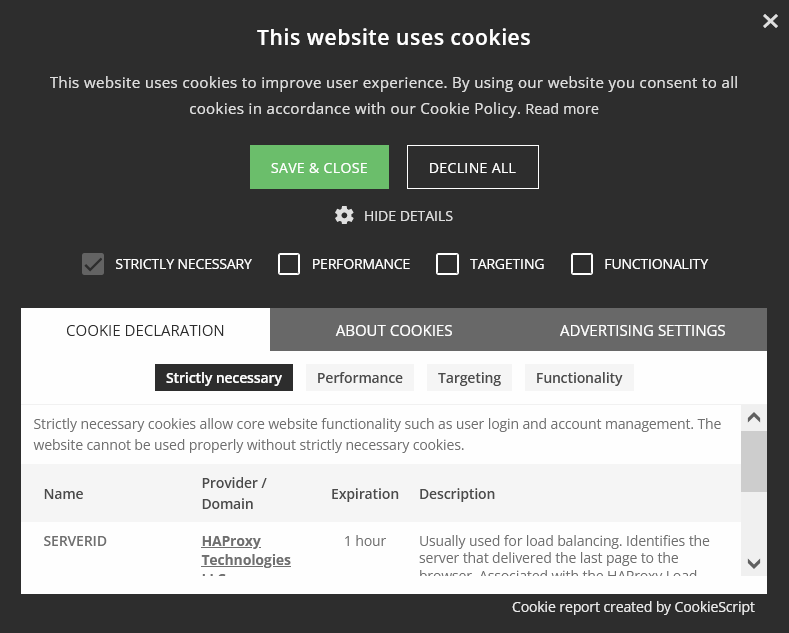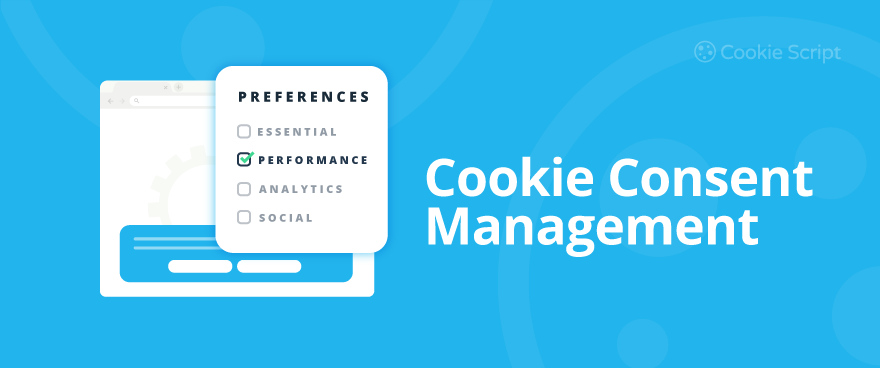Read about Cookie Consent management, Cookie Consent management tools, and best practices for Cookie Consent management.
Cookie Consent Management
The cookie law (ePrivacy Directive) was the first EU legislation to regulate the use of cookies and other trackers and process personal data from the European Union’s website users. The cookie law was passed in 2002 and was amended in 2009. It supplements the General Data Protection Regulation (GDPR).
The purpose of the Cookie Banner Law is to protect website users' privacy rights by providing the choice to accept or reject the Cookie Consent for companies to collect, store, and process website users' Personal Information. The eprivacy Directive requires obtaining cookie consent to use cookies. It is the reason why you're required to implement a Cookie Consent banner on your website that EU visitors can use to either accept or refuse consent to the non-necessary cookies that process users' personal data.

An example of a Cookie Banner, asking for a cookie consent.
There are several types of cookies: First-party and third-party cookies. First-party cookies are created by the website that the user is currently visiting. These cookies enhance the website's functionality and provide personalized experiences to the user. Some first-party cookies, called strictly necessary cookies, are essential for websites to function at all.
Third-Party Cookies are created by other websites that the user is visiting. These cookies most often are used for marketing purposes. They can track user behavior, deliver targeted ads, or gather data for analytics functions.
The usage of cookies and cookie consent is strictly regulated by privacy laws and is subject to cookie consent management.
Cookie consent management is a process of collecting and storing a website user’s cookie consent for their personal data collection and the use of cookies.
The cookie consent manager should treat first-party cookies and Third-Party Cookies differently.
GDPR Cookie Consent Management
Businesses that operate in the EU or collect data from European users are subject to the General Data Protection Regulation (GDPR). A key aspect of the GDPR regarding cookies is getting explicit cookie consent (opt-in option) from website users. This means that a website user must take a positive, affirmative action, such as checking a tick-box or another similar action in order to accept cookies. Simply informing users about the use of cookies is not enough.
Read the full GDPR compliance checklist for your website.
CCPA Cookie Consent Management
Any business that is based in California or has customers in California needs to comply with the California Consumer Protection Act (CCPA). Under the CCPA, implied cookie consent is enough, meaning that cookies could be set up on users’ devices by default. To stop setting up cookies, users must take action, informing websites about their preferences.
Most importantly, under the CCPA, websites must allow to opt-out from the selling of users’ Personal Information. Websites must provide a clear “Do Not Sell or Share My Personal Information” button or link on their website that allows users to submit an opt-out request.
Read the full CCPA compliance checklist for your website.
Cookie Consent Management Best Practices
Most importantly, cookie consent must be obtained BEFORE the collection or storage of any information about website users. Cookies couldn’t be set up on users’ devices prior to the receiving of consent.
We advise you to follow some best practices for cookie consent management:
- Provide clear information about the cookies, the type of cookies, and their purpose.
- A Cookie Consent banner should clearly ask for user consent and provide an option to both accept and reject cookies.
- Users should be able to withdraw their consent at any time. Rejecting cookies should be as easy as accepting them.
- The Cookie Consent banner should be visible and easy to find. It should be accessible on all pages of the website.
- The Cookie Banner should allow website users to select types of cookies.
- Do not restrict the usage of your website if the user does not agree with the usage of cookies and their collection of the personal information.
- Regularly review and update your Cookie Policy to ensure compliance with changing privacy laws.
Cookie Consent Management Tools
Since websites could have millions of users, which have different preferences regarding the usage of cookies and their personal data, the process of managing cookie consent could be complicated. Thus, an automated cookie consent management tool is needed to effectively manage the process.
The most efficient cookie consent management could be achieved with automation tools like Consent Management Platforms (CMP). The Consent Management Platform is a tool used to obtain and store cookie consent from website users to process their personal data.
A good CMP should possess these functionalities:
- Cookie Banner. CMP users should be able to create a cookie banner that matches their websites.
- Cookie Scanner. The CMP should have a tool to scan websites for cookies and create a cookie declaration table.
- Consent recording. The CMP should keep detailed records of all consents obtained from individuals.
- Consent administration. The CMP should allow centrally manage and organize cookie banners and consents.
- Multi-platform usage. The CMP should allow managing cookie banners and consents through all consent collection channels, including websites, apps, and other platforms.
- Integration with marketing platforms. The CMP should be integrated with marketing platforms and other consent collection channels of third parties.
- Compliance with privacy laws. The CMP should provide cookie management solutions that are compliant with adequate privacy laws. It is desirable that the CMP should have a geo-targeting functionality since different countries have different privacy regulations. It should also be able to demonstrate compliance for a particular individual at any time.
- Data privacy control. The CPM should allow any website user to see all the data collected about them, who is collecting it, and to whom it is shared or sold, if any.
- Consent revocation. The CMP should allow any individual to revoke their consent for each data collection and usage purpose at any time.
- Automatic consent management. The CMP should perform automation of all processes, including cookie banner generation and collection, storage, and management of user consent.
CookieScript CMP is one of the best Consent Management Platforms on the market. It has the following functionalities:
- Fully customizable Cookie Banner.
- Cookie Scanner.
- Privacy Policy Generator.
- Third-party cookie blocking.
- Cookie consent recording.
- Geo-targeting.
- Self hosted code.
- Integration with other platforms.
- Privacy laws’ compliance hints.
Do I Need Cookie Consent Management for My Website?
If your website uses Tracking Cookies, you need to obtain cookie consent from your users. There is no need for cookie consent just for strictly necessary cookies. Since most websites nowadays use cookies other than strictly necessary cookies, you need consent management for your website.
If you use Google Analytics or similar statistics tools for website statistics, you need consent management, since these tools come from third parties, and use Third-Party Cookies.
If you have embedded content on your site, such as YouTube videos or social media buttons, you need a consent management tool for your website as well for the same reasons, mentioned above.
In addition, cookie consent management is enforced by most privacy laws. Non-compliance with the privacy laws could lead to penalties. For example, non-compliance with the GDPR could lead to fines up to €20 million or 4% of the annual global turnover of a company. Non-compliance with the CCPA can seek civil penalties of $2500 for each law violation and could reach millions of dollars if a website has many users.
Conclusion
In conclusion, cookie consent management is a necessary process, required by most data privacy regulations. Cookie consent management is needed for compliance with GDPR, CCPA, and other privacy laws. Websites are required to obtain cookie consent before setting cookies on their devices and collecting any data from users. By following cookie consent management best practices outlined in this article, website owners can ensure compliance with the privacy regulations. While choosing a cookie consent management tool, consider the above-presented advice. CookieScript offers one of the best consent management platforms.
Frequently Asked Questions
What is Cookie consent management?
Cookie consent management is a process of collecting and storing a website user’s cookie consent for their personal data collection and the use of cookies. The most efficient cookie consent management could be achieved with automation tools like Consent Management Platforms (CMP). CookieScript CMP is one of the bests in the market.
Is cookie consent required by GDPR?
If your website uses Tracking Cookies, other than strictly necessary cookies, you need to obtain cookie consent from your users. Since most websites nowadays use cookies, you need cookie consent for your website. If you use Google Analytics or similar tools for website statistics, or if you have embedded content on your site, such as YouTube videos or social media buttons, you also need cookie consent for your website. CookieScript CMP is one of the bests consent management tools in the market.
Do I need cookie consent management for my website?
If your website uses tracking cookies, other than strictly necessary cookies, you need to obtain cookie consent from your users. If you use Google Analytics or similar tools for website statistics, or if you have embedded content on your site, such as YouTube videos or social media buttons, you need consent management for your website as well. Cookie consent management is enforced by most privacy laws: non-compliance with the privacy laws could lead to penalties.
What is the principal requirement for the GDPR Cookie Consent Management?
A key aspect of the GDPR regarding cookies is getting explicit cookie consent (opt-in option) from website users. This means that a website user must take a positive, affirmative action, such as checking a tick-box or another similar action in order to accept cookies. Simply informing users about the use of cookies is not enough. Use CookieScript CMP to comply with the GDPR and other privacy laws.
What is the principal requirement for the CCPA Cookie Consent Management?
Under the CCPA, websites must allow to opt-out from the selling of users’ personal information by providing a clear “Do Not Sell or Share My Personal Information” button or link on their website that allows users to submit an opt-out request. Use CookieScript CMP to comply with the CCPA and other privacy laws.
Who is responsible for cookie consent?
Under the GDPR, the data controller is responsible for getting cookie consent. The website is the data controller and is therefore responsible for collecting valid cookie consent and collection and management of users’ personal data. Use CookieScript to comply with the GDPR and other privacy laws. CookieScript has privacy laws compliance hints, so you can be sure about your website compliance.
What is required for cookie consent?
Websites must provide clear information about the cookies and their purpose. A Cookie Consent banner should clearly ask for user consent and provide an option to both accept and reject cookies. Users should be able to withdraw their consent at any time. The cookie consent banner should be visible and easy to find. Find out more at the CookieScript blog.
